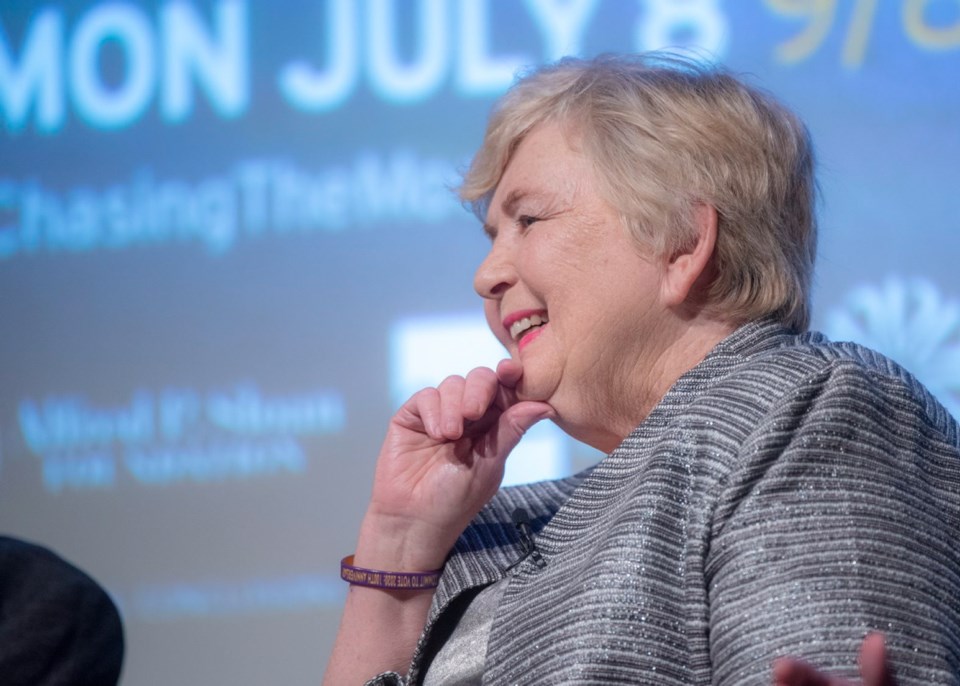ON SCREEN
What: Apollo 11: First Steps Edition
Where: Imax Victoria, 675 Belleville St. (in the Royal B.C. Museum)
When: Sept. 20 through Oct. 5
Tickets: $5.40-$11.95 from imaxvictoria.com or 250-480-4887
Note: Poppy Northcutt will be in attendance and answer questions during preview screenings at Imax Victoria Sept. 18 and Sept. 19 at 6 p.m. and 7:30 p.m.
From her desk at the Johnson Space Center in Houston, Texas, engineer Frances (Poppy) Northcutt helped astronauts enter uncharted territory during the early days of space exploration.
As the first female engineer to work in NASA’s Mission Control, she was also breaking ground on Earth.
Northcutt worked for NASA during the height of the space race, including Apollo 11’s successful lunar landing in 1969.
She also worked on Apollo 13, the failed mission that prompted commander Jim Lovell to utter the famous, but oft-misquoted, line: “Houston, we’ve had a problem,” as well as Apollos 8, 10 and 12.
Her workstation during that era — a windowless room in NASA’s Mission Control — wasn’t what you would call remarkable. But her role in five space missions during a two-and-a-half year period was anything but ordinary.
Apollo 11: First Steps Edition has put Northcutt back in the news. The film — a shortened version of Todd Douglas Miller’s critically acclaimed documentary Apollo 11 — opens at Imax Victoria on Friday, the latest in a long line of North American celebrations of the space mission’s 50th anniversary.
Northcutt, who was in Mission Control in Houston when Neil Armstrong and Buzz Aldrin became the first people to walk on the moon, will be in Victoria for preview screenings of Apollo 11: First Steps Edition tonight and Friday, and will answer questions from the audience.
The film is visually astonishing — most scenes use original 70mm footage that wasn’t discovered until 2017. Miller and his team paired the rare footage with dialogue taken from more than 11,000 hours of original audio recordings and digitally restored television broadcasts from 1969.
One of the most successful documentaries ever made, Apollo 11 earned more than $12 million US at the box office and currently holds an approval rating of 99 per cent on Rotten Tomatoes.
The success of the film has brought back memories for Northcutt, 76, who spent most of her career as a lawyer.
“It was a proud moment for everyone on the planet,” Northcutt said of the Apollo 11 mission. “And to participate in that, it was certainly a proud moment for me. It was a big human achievement to do that. Today, they have the benefit of 50 years of technology that was not available then.”
Northcutt, who has a degree in mathematics from the University of Texas, wasn’t the only woman associated with the U.S. space program. Instrumentation controller JoAnn Morgan was in the launch firing room for Apollo 11, while black female mathematicians at NASA, who were the subject of the Oscar-winning film Hidden Figures, played a crucial role in Apollo 11 and other missions.
But because she was a return-to-Earth specialist, who ran the computer programs that got astronauts out of orbit around the moon and back to Earth, Northcutt was assigned to Mission Control.
As she would come to discover, not every department at NASA was as open-minded as hers.
“I was very lucky that I worked for a very progressive contractor [TRW Systems], because it was a very male-dominated era — it was the Mad Men era,” she said. “There were very few women who were in non-stereotypical jobs, period.”
Northcutt received the Presidential Medal of Freedom Team Award for her role in returning the crew of Apollo 13 safely to Earth after it lost power in 1970 (a series of events chronicled in the 1995 Oscar-winning Ron Howard film starring Tom Hanks).
She said she never felt undervalued and didn’t realize until later, due to the secretive nature of some NASA departments, that women weren’t widely represented. “I was completely divorced from what the public sees,” Northcutt said. “I was sitting at a console in the flight dynamics room.”
Budget cuts at NASA sent her to the Houston mayor’s office in 1972, where she was hired to improve the representation of women in city government.
Northcutt eventually became a criminal lawyer, helping to pass the Texas Equal Rights Amendment. She would not return to the space program, despite having done subsequent work on advanced lunar missions and crewed missions to Mars following Apollo 13. “I’m not a space junkie. But I think it’s very interesting. I’m certainly very hopeful that it will expand and we will go back to the moon and beyond.”
She was approached by a filmmaker who wanted to put her story on the screen years ago, but she flatly refused. “I discouraged it,” she said with a laugh. I wasn’t too keen on it. I’m happy to go out and talk about [space missions], but to have someone dig around your life story, it seems sort of invasive to me.”
The self-proclaimed “one-time rocket scientist, sometime lawyer, full-time feminist” and former president of the Texas chapter for the National Organization of Women said she enjoyed her time working at NASA, and is happy if her story inspires a new generation of women to follow her path.
“I’m really interested in encouraging women and girls to work in these areas, and to let them know women and girls can work in these areas. There is still such an under-representation of women.”



